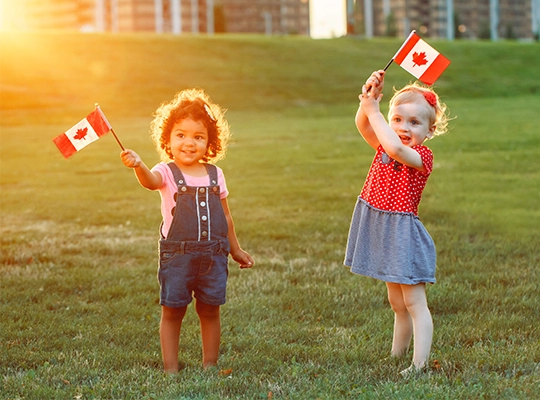
Building Bright Futures Together: Sponsor a Dependent Child for Permanent Residency in Canada. The Government of Canada has raised the age of dependent children to be under 22 who do not have a spouse or common-law partner. Children older than 22 are also qualified as dependents under certain circumstances.
Years of Experience in industry

Immigration & Visa so far

The Family Class sponsorship program permits Canadian citizens and permanent residents to bring their biological and adopted children from other countries to live together as permanent residents in Canada. Experience the joy of family reunions and write a new chapter in Canadian history.
A child is classified as a dependent if he or she is unmarried, not in a common-law relationship, and under the age of 22. However, there is an exception for children over the age of 22.
Children over the age limit can be considered "over-age" dependents in certain circumstances if they have relied on their parents for financial support before attaining the age limit. Furthermore, they must be unable to sustain themselves financially due to a mental or physical illness. This exception recognizes the unusual circumstances of children who require continued assistance after reaching the standard age requirement.
As long as the dependent child being sponsored does not have any kids of their own, Canadian citizens or permanent residents are excused from achieving the Minimum Necessary Income (MNI) criteria. If the dependent child has dependent children of his or her own, the MNI requirement for the size of the specific family group he or she is sponsoring must be met.
Feel free to contact us for your queries. Our foreign immigration lawyers and consultants are happy to help you.
1
2
3
4
Our team of immigration lawyers and specialists provides personalized support and direction to make your immigration smooth.

We ensure your documents meet all requirements with our document preparation & verification service.

We handle your application, keeping you informed with clear timeframes for each steps.

Rely on our pre & post-landing support, designed to ease the transition and help you settle smoothly in desired country.

When seeking permanent residency in Canada, your child must be under the age of 22 and not have a spouse or partner.
Processing durations are normally around 12 months but might vary according to the nation of origin.
The best way to avoid delays in processing your application is to make sure that your contact information and application details are up-to-date.
Your child may already be a Canadian citizen if at least one parent (biological parent or legal parent at birth) was born in Canada or became a citizen of Canada before the child was born.
All dependent children included in a sponsorship application must pass all necessary police and security checks, as well as medical exams.
Canada promotes family reunion. This visa program allows the applicant to include your children in the application. For instance, If you have children under the age of 22, you can be easily included them in the visa application. And there is no age limit for those children who have certain health conditions or specially-abled. These dependent kids hold the right to live, study and work in Canada.
You need to meet several requirements to sponsor your child for entry to Canada.
Meeting these criteria is crucial to be eligible for sponsoring your child's entry into Canada.
International adoption is subject to different rules and procedures in the child’s home country. Some points to consider are:
Sponsorship for children adopted outside of Canada to travel to Canada is feasible, provided the following conditions are met:
It is critical to seek precise and up-to-date information relating to your circumstances from relevant immigration and adoption authorities.
The Hague Convention safeguards the rights of children and their families. It ensures that adoption between nations is done in the best interests of the child and respects their human rights establishing cooperation between nations to prevent adoption, prevent their illegitimate children, child abduction and trafficking and ensure adequate protection. In the case of Hague adoptions, the authorities of both countries must agree to continue the adoption process. Non-Hague children may have state-dependent requirements. Adoption in the child's home country is not permitted under the Hague Convention. Provinces and territories regulate adoption procedures, following legislation implementing the Convention. Guidance may be given on compliance with the Hague Convention and its ratification by non-Contracting States.
Adopted children must undergo a medical examination before being granted a permanent residence permit. Your state or territory, or licensed adoption agency will notify you of the schedule and time of the inspection. Additionally, you will need to sign an acknowledgement of receipt of information about any of the child’s medical conditions.
Get the application form from the official website, which contains a guide with instructions and documents to help you complete the process accurately. Pay the online application fee, which covers processing fees, permanent residence rights, biometric fees, and any other third-party fees for all parties involved in the application process. Follow the submission instructions outlined in the downloaded instructions to submit your application. Provide the required supporting documentation as requested by IRCC during the application process.
ImmiLaw Global has a team of qualified and experienced immigration consultants that provides all immigration services in the best way. Our immigration service team executes the process in accordance with predetermined guidelines under the direction of a group of qualified Canadian immigration lawyers. The appointed immigration service executives keep track of the application, making sure that all processes are fulfilled within the allotted time frame.
Contact us for your immigration application assistance. Forget all your concerns when we are with you.